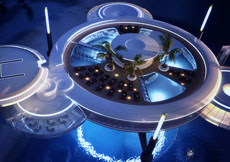The Anti-Corruption Commission (ACC) will hold festivities to mark International Anti-Corruption Day, recognised on December 9 since 2008, in Gaaf Dhaal and Gaaf Alif atolls. These atolls reported the most corruption cases this year.
The UN Convention against Corruption was adopted by the General Assembly in 2003, and entered into force in 2005. This is the first year that International Anti-Corruption Day has been held outside of Male’.
ACC President Hassan Luthfee said the decision to hold the event outside of Male’ intends to fill a deficit.
“We need to go to the public area, particularly on islands, because we haven’t been to these parts of the country,” he said. “A majority of cases were reported from Gaaf Dhaal.”
Transparency Maldives recently reported that the Maldives had improved in the Transparency International Corruption Perception Index (CPI) to rank 134th out of 183 countries and territories world wide, up from the 2010 rating of 143rd.
This year, the Maldives scored 2.5 on a scale of 0 (highly corrupt) to 10 (very clean), placing it alongside Lebanon, Pakistan and Sierra Leone. It is still rated as having a higher perceived corruption than regional neighbors including Sri Lanka (86), Bangladesh (120) and India (95).
Project Director of Transparency Maldives, Aiman Rasheed, warned that the ranking could not be compared year-to-year, especially in the Maldives where there were only a three sources used to determine the index (India has six).
“Corruption in the Maldives is grand corruption, unlike neighbouring countries where much of it is petty corruption,” Rasheed said. “In the Maldives there is corruption across the judiciary, parliament and members of the executive, all of it interlinked, and a systemic failure of the systems in place to address this. That why we score so low.”
Faced with such endemic and high-level corruption, it was “up to the people of the Maldives to demand better governance”, he said.
Luthfee countered that the Maldives’ ratings show gradual improvement.
“In 2008 the index ranked us at 2.8, then 2.5, then last year was 2.3 and now we’re back to 2.5. India ranked at 95, but we are very far behind that,” he said.
Understanding the scores in context required a wider public understanding of corruption, Luthfee explained. “In this country, people perceive corruption as some powerful people trying to get money from the government,” he said. “But it’s more than that. Things like human trafficking and political stability are part of the picture as well.” He emphasised the human trafficking was a major concern.
Luthfee said the ACC hosted one workshop in the atoll this year for government employees, school staff and children, and the general public. He attributes the atoll’s high report rate to increasing awareness.
“People are more aware of the reporting mechanism, now they blow the whistle whenever they come across [corrupt situations],” he said.
When asked whether the whistle was being blown too frequently for political reasons, Luthfee recommended greater government control.
“I do believe there is a huge problem in this area. The government needs to implement reporting mechanisms for the opposition and for the international arena, because they play a major role in the corruption issue. Things are easily politicised, and a considerable amount of allegations are made for a political purpose,” he observed.
The ACC is currently unable to investigate cases involving international parties, Luthfee explained. Giving the example of foreign bank accounts, he said that without proper resources certain financial-political cases escape the ACC’s domain.
Prosecution procedures are also an obstacle. “Our mandate is just to investigate, and if we feel it has to go to the Prosecutor General (PG) we send it there. But none of the 16 cases we filed this year have been prosecuted. The outcome is zero,” Luthfee said.
The PG’s office told Minivan News it would provide the statistics on the number of cases prosecuted tomorrow.
President’s Office Press Secretary Mohamed Zuhair said a lack of judicial follow-up was contributing to the hold up, and added that President Mohamed Nasheed was expected to ask the ACC to expedite cases currently stalled at the PG office. “Cases from the previous and current government need to be addressed,” he said.
Zuhair said many corruption allegations were made with political motives. “Right now you have politicians being accused, the government being accused, and all are seen to be for political gain. These are just empty allegations,” he said.
“Some are following the proper procedures but some are not. Without the procedure you can’t get a court ruling, and until something is resolved the perception is all that matters. Most people accused of corruption are believed to be corrupt, and that is very damaging. There needs to be better discipline among politicians.”
Minivan News asked Luthfee what his top recommendation was for combating corruption in the Maldives.
“We as Muslims have to keep our way of life in a way that complies with Islam. People now are just not following the right path, and they should make a stronger effort in this respect,” he said.
For International Anti-Corruption Day, the ACC will distribute information pamphlets at an awareness forum, and will host several activities for students. Haveeru has also reported that the next Friday prayer sermon will focus on the negative effects of corruption in society.
Likes (0)Dislikes
(0)Dislikes (0)
(0)  Various modules can be attached ranging from spas to a restaurant, helipad and dive school. A decompression chamber is built into the lower part of the structure.
Various modules can be attached ranging from spas to a restaurant, helipad and dive school. A decompression chamber is built into the lower part of the structure.